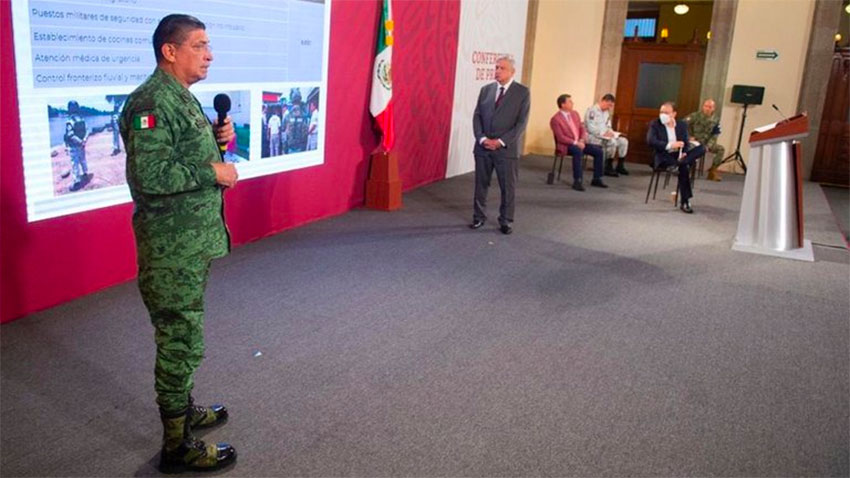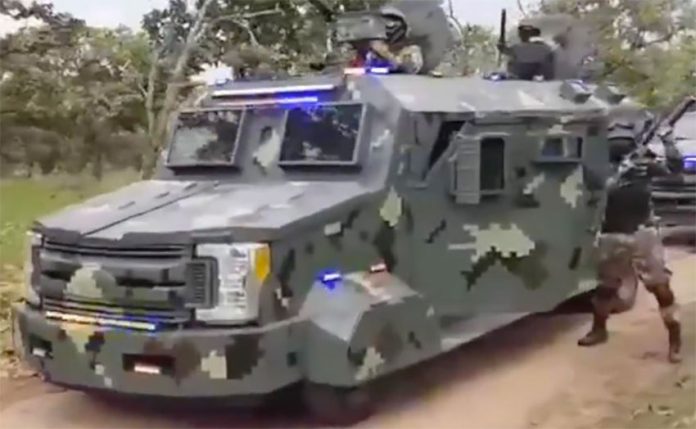Two cartel videos posted online in recent days are courtesy of the “elite group” of the Jalisco New Generation Cartel (CJNG), National Defense Minister Luis Cresencio Sanddoval said Tuesday.
One video shows scores of heavily-armed and masked men shouting support for CJNG leader Nemesio “El Mencho” Oseguera Cervantes while standing alongside a long convoy of armored vehicles.
The other video, which also shows armed men and military-style vehicles, is narrated by a man who directs a threat at José Antonio “El Marro” Yépez Ortiz, leader of the Santa Rosa de Lima Cartel, which is engaged in a bloody turf war with the CJNG in Guanajuato.
The narrator says that the CJNG’s dispute in Guanajuato is not with the people or the government but with the “filthy, innocent-slaying” Yépez.
“Marro, understand once and for all that all of Guanajuato has an owner and it’s the CJNG,” the narrator says before giving voice to a threat to kill all members of the Santa Rosa de Lima Cartel, a fuel theft, drug trafficking and extortion gang.
Speaking at the president’s news conference on Tuesday morning, Sandoval said the release of the first video last Friday coincided with the birthday of Oseguera, Mexico’s most wanted drug lord.

The army chief said that the aim of both videos is to show off the firepower of the elite group of the CJNG, considered the most powerful and dangerous criminal organization in Mexico.
Sandoval said the government has information that the cartel’s elite group was formed last year and is led by Juan Carlos González, a man also known as “El 03.”
The leader of the elite group in Jalisco is Ricardo Ruiz Velazco, alias “El Doble R,” he said.
Sandoval said that the CJNG elite group is the only one of its kind in the country and that it operates in parts of Michoacán, Guanajuato and Zacatecas.
In response to the threat against Yépez and the crime group he leads, the army chief said that security will be bolstered in Guanajuato – the most violent state in the country – and all other states where the CJNG operates in order to avoid “any situation that could have a negative impact” on the general population.
For his part, President López Obrador asserted that his administration “won’t declare war” on drug cartels in response to the two CJNG videos even though they are seen by some analysts as a challenge and threat to the authority of the government.
“Let it be very clear: no to war, yes to peace,” López Obrador said, repeating the position he espoused in late June after an attempt on the life of the Mexico City police chief that was allegedly ordered by the CJNG.
“Declaring war is not the solution, we already know what that causes,” he added, referring to the huge number of deaths in the almost 14 years since former president Felipe Calderón launched the so-called war on drugs by sending the military into combat against cartels.
The president said that the cartel videos are also a legacy of the security strategies implemented by past governments and renewed his commitment to combatting violence with a non-confrontational approach that respects people’s human rights.
“I continue to call on everyone to behave well, let there be hugs not bullets,” López Obrador said.
“An eye for an eye, a tooth for a tooth, the law of retaliation, no!. … I don’t agree with the retaliation law. If we resort to that, we’ll be left one-eyed or toothless,” he said.
“We have to convince, persuade [people to stop the violence]. Peace and tranquility are the fruits of justice. Violence cannot be confronted with violence, fire isn’t put out with fire, evil cannot be confronted with evil; evil has to be confronted by doing good. So we’re not going to change [our strategy].”
The president did, however, publish a decree in May that ordered the armed forces to continue carrying out public security tasks for another four years, effectively perpetuating the militarization model he frequently rails against.
Source: Infobae (sp), El Universal (sp)
